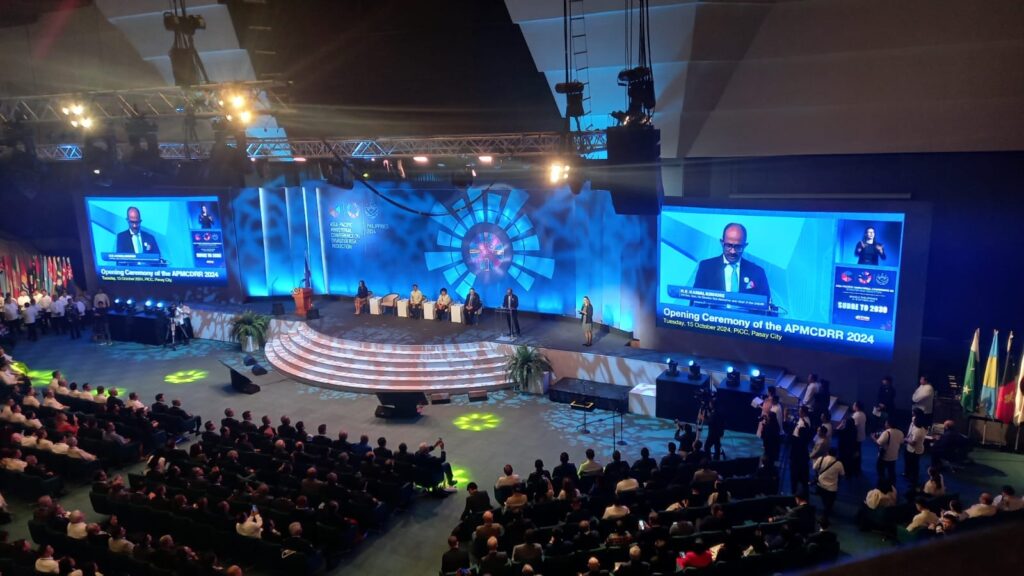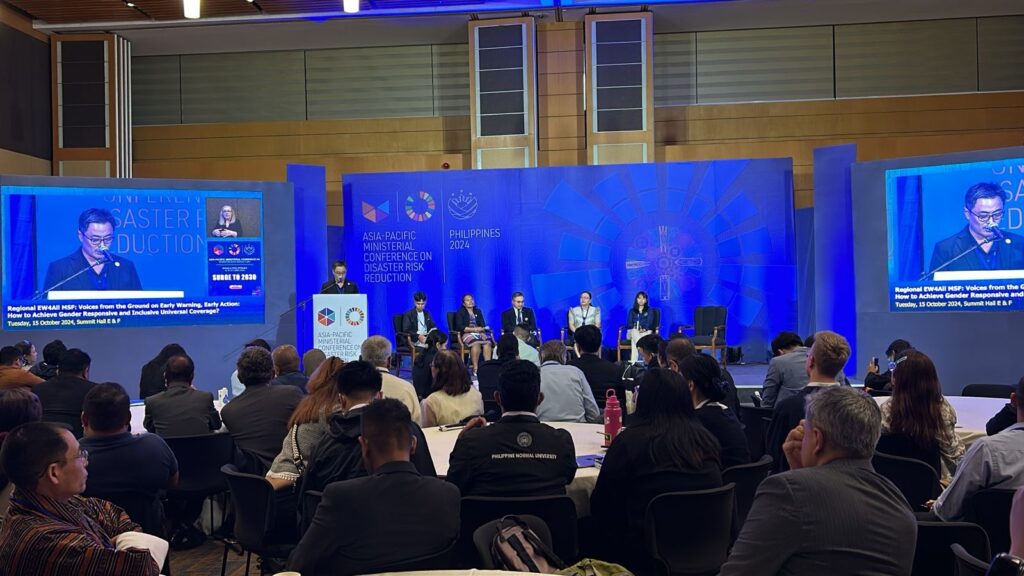Day 1: Monday 14 October 2024
GNDR is in Manila, Philippines this week at the Asia-Pacific Ministerial Conference on DRR (APMCDRR), alongside some of our members. We will be sharing updates and reflections throughout the week on this page. Day 1 of the conference began on Monday 14 October, and began as a preparation day.
Special Sessions and Partner Events
A number of Special Sessions and Partner Events took place throughout the day. Key highlights:
- The Partner Event on Transboundary Water Governance to Enhance Local Access to Finance for Climate and Disaster Resilience. GNDR Policy and Research Officer, Jekulin Lipi, was a speaker at the event. Jekulin spoke about the need to recognise and include youth in leadership roles for transboundary water governance especially for information dissemination and locally led actions.
“Youth bring new perspectives, energy and innovative ideas that should be integrated into water management and climate resilience policies.” Jekulin Lipi (below, left)
- The Special Session on Asia Pacific Resilient Recovery Dialogue in which our Head of Programmes, Shivangi Chavda, was a speaker. Shivangi highlighted how GNDR works to empower communities most at risk by equipping them with the tools and knowledge for resilience and enabling them to actively participate in risk and recovery decision-making. Community voices are amplified through evidence-based advocacy by analysing disaggregated data collected from communities on the frontline. GNDR then follows up with capacity building and technical support for local actors, civil society organisations and governments and collaboration and knowledge sharing across countries, both regionally and globally.
“Countries must develop pre-disaster recovery financing strategies to ensure resources are available to support vulnerable groups. Given the limited fiscal space in many nations, adopting fit for purpose financing strategies is essential to prevent marginalised communities from being left behind due to delays in resource allocation.” Shivangi Chavda (below, right)

Stakeholder consultations
Stakeholder groups of the UNDRR Stakeholder Engagement Mechanism (SEM) were invited to conduct consultations to finalise stakeholder statements. Eight stakeholder consultations were held throughout the day – Women and Gender, NGOs/Civil Society, Private Sector & Business and Industry, Persons with Disabilities, Red Cross and Red Crescent Societies, Local Authorities, Science, Technology, Academia Group, and Children, Youth and Child-Centred Organisations.
At the NGO/Civil Society Group stakeholder consultation meeting, GNDR’s partner network – Asian Disaster Reduction and Response Network (ADRRN), shared a CSO Commitment to Action. This was a pledge to take actions to reduce the gaps of current status and desired goals of the Sendai Framework for Disaster Risk Reduction (SFDRR). Another significant outcome was the launch of the Asia Pacific CSO Forum as a platform for CSOs in the region. The forum will have a key focus on disaster risk reduction, climate change and humanitarian response in the context of development and conflict.
Celebrating CSO champions
Finally, we ended the day by celebrating five CSO champions recognised for their ground-breaking work in resilience at the Asia-Pacific Local Leaders Forum for Disaster Resilience Awards. ADRRN and Sustainable Environment and Ecological Development Society (SEEDS) (a GNDR member organisation) organised the Awards.
Day 2: Tuesday 15th October
Day 2 was the first official day of APMCDRR and it began with the official Opening Ceremony.
Key messages shared by President Ferdinand Marcos Jr. included:
- The importance of creating a safer, more inclusive and disaster-resilient future
- The need to significantly scale up investments and develop financing mechanisms for disaster risk reduction
- The need to harmonise efforts across sectors to reduce disaster risks and losses by focusing on building resilience
- Climate change and disasters are catalysts for human displacement
- The Philippines’ commitment to fostering partnerships, collaborating on disaster risk reduction, and leveraging local and international resources and expertise to strengthen the region’s ability to withstand future challenges.
Mr. Kamal Kishore, the Special Representative of the Secretary-General (SRSG) emphasised the urgency to accelerate disaster risk reduction efforts in the Asia-Pacific region. He called for enhanced cooperation and innovation to mitigate the impacts of climate change and disasters. He also highlighted the importance of integrating science and technology into disaster management and ensuring that no one is left behind in these efforts, particularly marginalised and vulnerable groups.

Mr. Kamal Kishore giving his address during the opening ceremony
The opening ceremony was followed by a plenary session on ‘Practical Solutions to Enhance Disaster Risk Reduction Finance’ with speakers from the government, private sector, and development banks from Asia and the Pacific. The session focused on the need to invest in resilience by addressing risks across sectors, scales and geographies throughout all of society. This will ensure inclusive and context specific approaches. The session also emphasised the importance of regional cooperation, private sector engagement, and the need to adopt innovative approaches to disaster finance based on analysis of past disaster data.
Voices from the ground on early warning, early action
GNDR, in collaboration with UNDRR SEM and IFRC, organised and led a session at the Regional Early Warning for All Multi Stakeholder session. The session was called ‘Voices from the ground on Early Warning, Early Action: How to Achieve Gender Responsive and Inclusive Universal Coverage?’
The session spotlighted the perspectives of local communities and highlighted the role they play in early warning systems. It began with an interactive simulation exercise in which audience members were asked to play specific roles within a community. These roles included a breastfeeding mother, a student and a tourist among others. Shortly after a typhoon red alert was issued. The exercise highlighted how different community stakeholders react to early warnings, and the varying contexts and challenges they face to take timely action.
After the simulation, Mr. Dharam Uprety (GNDR and Duryog Nivaran member from Nepal) gave a keynote speech highlighting the importance of inclusive early warnings that recognise the varying capacities of community stakeholders. This was followed by a panel discussion, moderated by Mr. Takeshi Komino (Vice president of ADRRN and GNDR NFP for Japan). The panel was made up of five speakers:
- Mr. Rex Vencent representing children and youth stakeholders
- Ms. Emidia Belo from Red Cross Timor-Leste representing national red cross/red crescent societies
- Mr. Hendry Hernowo representing people with disabilities
- Ms. Emily D. Fajardo, Chairperson Kababaihang Bataeno para se Kalikasen, Karapatan at Pagbabgo (KaBaRo) representing women
- Ms. Dhinar Riski, Project Manager, Yakkum Emergency Unit representing local civil society organisations

Takeshi Komino pictured chairing the panel discussion
Key reflections from the session were:
- Youth play an important role in disseminating warning information and can influence the adoption of early action
- There is a need for localised, context specific early warnings
- There is a need to make early warnings accessible to people with disabilities – social media plays a key role here
- Women have a crucial role to play in assessing risks and disseminating early warnings at a community level
- CSOs can support governments to set up effective and inclusive early warning systems by establishing feedback mechanisms and analyse emerging gaps
- Early warnings do not automatically lead to early action – stakeholder responses are dependent on personal experiences, capacities and contexts
- There is an urgent need to support behaviour change within communities to develop a positive relationship with early warning systems
- Fostering trust among different stakeholders requires long-term engagement and sustainable programming
Closing remarks were given by Mr. Harold Rice from UNDRR. He emphasised that each community stakeholder group have unique capacities and experiences and all have a critical role to play in Early Warning and Early Action. He called for the need to leverage these diverse capacities and collaborate across sectors to build effective and inclusive early warning systems. In short, he called for Early Warning With All!
Day 3: Wednesday 16th October
Day 3 of APMCDRR began with a plenary session: ‘Leaving No One Behind: Gender Responsive and Disability-Inclusive Disaster Risk Governance’. The session focused on how diverse disaster risk governance ca:
- Enhance disaster and climate resilience
- Address gaps in disaggregated data and risk knowledge
- Promote inclusive, people-centred approaches.
A number of events took place during the day including thematic sessions, learning labs, partner events and the Regional Early Warning for All Multi-stakeholder Forum.
Highlights
IFRC led a session at the Early Warning for All Multi-stakeholder Forum on ‘Risk Communication and the Role of Media and Social Media for Inclusive and Actionable Early Warning Messages’. This was co-organised by GNDR. The session began with a keynote speech by Ms. Kathryn Clarkson of IFRC who highlighted that in an age of social media and artificial intelligence, early warning systems continuously face the challenge of trying to gain the trust of communities because of the rapidly growing circulation of misinformation and disinformation. Ms. Gwendolyn Pang, Secretary General, Philippines Red Cross (and moderator of the session) shared that of the 5.2 billion people who have access to the internet, over 64% are active social media users. This can be advantageous if systems are established to use social media channels effectively to issue early warning systems.
Key takeaways:
- Mr. Hisan Hassan, Chief Executive of the Maldives NDMO highlighted their work as the first country to develop the Roadmap for Early Warning for All. He spoke about the Maldives government’s efforts to make early warnings more inclusive by developing a mechanism for issuing audio messages and messages adapted for people with autism.
- Ms. Dalen Sea from Young People’s Action Team, UNICEF explained the role youth play in early warning messages and how their access to social media can be advantageous.
- Mr. Alfred Mark Rosete from People in Need spoke of the benefits of the internet. He cited an example of using digital technology to make early warning systems more inclusive for flood prone vulnerable communities.
- Ms. Gemma Hayman from BBC Media Action shared how risk communication needs to be people centred to enable communities to take appropriate action once an early warning is issued.
- Ms. Kia Obang from Internews Philippines spoke about the need for media to tackle disinformation. This can be achieved by creating healthy information ecosystems that fact check, bust myths, enable media and information literacy and make media accountable to communities.
Another session at the Early Warning for All Multi-stakeholder Forum was a ‘Regional Anticipatory Action Dialogue’. This was led by the Anticipatory Action Working Group and co-organised by UNDRR SEM. The session convened key stakeholders including youth, government and civil society to discuss the institutionalisation of anticipatory action across different sectors. The panel included speakers from the Indonesian, Lao PDR and Pakistan governments. Young people from India, Fiji and the Philippines also shared their experiences.
The discussions highlighted the need to:
- Promote behavioural change across generations to embed anticipatory action as a foundational principle for resilience
- Mainstream anticipatory action into national plans
- Revive traditional knowledge and enhance impact-based forecasting.
- Secu
The session also underscored the importance of government buy-in, legal mechanisms and cross-sectoral collaboration to institutionalise anticipatory action effectively and to address the challenges in scaling up across the differing contexts in the region.

GNDR’s Jekulin Lipi speaking at the Regional Anticipatory Action Dialogue